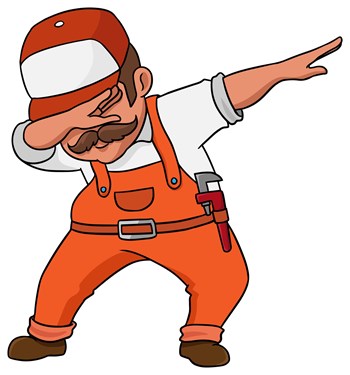
Your property’s staff—in particular its maintenance staff—is the oil and muscle that keeps your building or HOA in shape and operating from day to day. There’s a reasonable expectation in shared interest communities that the property and its amenities will be kept as clean, safe, functional, and attractive as possible—and a crucial part of meeting that expectation is the work of superintendents, building engineers, custodians, and handypersons. The management of those responsible for maintenance is obviously key to their performance and morale.
Respect & Responsibility
Effective management begins with mutual respect and teamwork, says Scott Wolf, CEO of Brigs, a management firm located in Boston. “Treat [your staff] well, or they’ll leave. With respect to our maintenance guys—all our staff, really—we try to provide an organized and structured workflow so they know their schedules. They have the right keys, access, etc. Everything is well coordinated so they can do their jobs easily and efficiently. We pay a good wage and benefits. Our staff is always treated fairly. As I said, it’s the same scenario with every employee, but from a maintenance staff standpoint it’s also recognizing that when it’s 100 degrees out, you provide water. If it’s frigid cold, give them hot chocolate and coffee. It’s treating people well and with respect and recognizing what they do. The truth is, your maintenance people are the ones who make you look good.”
Even with all the best intentions, of course things don’t always run smoothly. Breakdowns in communications and misunderstandings are inevitable. But what can a manager do, and how should he or she handle weak links in the personnel chain? It must be done calmly, with a bit of finesse, and according to established rules.
“As the manager,” says Dan Wollman, CEO of Gumley Haft, a management firm located in New York City, “you are at the top of the pile. You must have a plan and maintenance schedule to keep things in the best working order. If there’s a problem, and that problem turns out to be an employee, I recommend ‘progressive discipline.’ You need to be clear about expectations. Put everything related to the problem in writing. The employee needs to read the summary of the problem and understand it. They should sign off on the document. Then implement progressive discipline; the first offense receiving the lightest discipline. If corrective measures are not taken on the part of the employee, more discipline can ultimately lead to suspension, or even firing.”
As New York, unlike many other places, is a union town, the building service workers union can be a factor in disciplinary matters. Though the union advocates for their members, they support progressive discipline. Wollman notes that they may push back. Often it depends on seniority, etc.
Chain of Command
And speaking of that seniority—as in the military or a restaurant kitchen, having a clear chain of command in the management of staff at shared-interest communities is key to smooth and orderly operations. In the chain, policy is set by the board, and the general manager (if there is one) is tasked with executing that policy. In many cases, there is also a resident manager who may manage the staff directly or have assistant managers who are responsible for different divisions of the staff, say maintenance versus security. The final rung on the ladder is the staff members themselves–the all-important people who are responsible for the physical maintenance and security of the property.
Some states require that shared interest communities have onsite management. “In Florida,” says Gen Moxie-Adams, vice president of operations with AKAM, a management firm with client communities in both Florida and New York, “there must be a community association manager (CAM) on the property, even if you are self-managed. A self-managed association would hire someone without an affiliation to a particular company. That’s the law. Typically you have a manager, then, depending on the size of the community, an assistant manager. Under that you might have a chief engineer or a maintenance supervisor, which is something like a super. They are the boots on the ground, so to say. A larger community might have a property manager, assistant chief engineer, front desk persons around the clock, then a maintenance team under the chief engineer, a housekeeping team with a supervisor, and possibly an office staff under an assistant manager. The chain continues all the way down to a full-time valet.”
This chain of command is critical for effective management of the physical plant, says Wollman. “For many top level managers, they can’t be there physically all the time–especially when they manage more than one property. One may be dependent to an extent on a resident manager or general manager. In other words, you may depend on that person to be ‘you,’ or at least your eyes. They tell you what they see, and you make your decisions based upon what they tell you and what you might see in photos.”
This is more of an issue for larger, national companies where on-site resident managers may report to general managers located at some distance from the property.
And, as Wollman notes, sometimes it’s a matter of personal management style. “I’m more of a hands-on manager,” he says, “so I need to be able to visit the site and work closely and personally with the staff. That builds leadership and professionalism, in my opinion.”
Working for Residents—a No-No?
With clear lines of demarcation necessary for the proper operations of any community, one question that often blurs that line is whether maintenance staff should do private, ‘off-label,’ work for individual residents. In general, the answer is a resounding NO. But, of course, there are gray areas.
“I do not recommend this,” says Moxie-Adams. “Employees are there for the association, for common area issues. Not for private work with individual residents. We had a situation where an association member hired one of the staff for a plumbing issue, and they flooded out three floors. It’s just a bad idea. We have a policy in the buildings I manage that it’s not allowed. There’s just too much potential liability.”
Wolf concurs. “No, never. If the work is being performed Monday through Friday during working hours while they are on the association’s payroll clock, the side job is ‘double-dipping,’ and they are not insured to do the work. In the event of an injury, the building’s insurance will not cover it.
“We just began managing an association where a situation like this came up,” he continues. “There were questions about the employee’s own insurance. He said he was properly insured, and reluctantly the board’s ultimate decision was to allow him to do work for existing clients, but no new clients. There were also limits placed on when he could do this work. He had to supply proof of insurance.”
When Do You Outsource?
So, what types of tasks can be delegated to in-house staff, and what types of work should be handled by outsourced professionals? How do you know? Often it’s a matter of complexity and commensurate skills.
“If the work requires a trades license, we will outsource,” says Wollman. “Roof patching, for instance. We need a warranty and guarantee for the work, and that it’s been done correctly. We also don’t want the super or staff person invalidating a warranty. As fiduciaries for the association or corporation, we must be very careful. Vendors must be qualified and knowledgeable, and know what to use and how to make the specific repairs. We don’t want staff doing this kind of work.”
“Anything requiring a permit is outsourced,” Moxie-Adams concurs. “Also, anything requiring a license. Anything in the common area is the responsibility of the association, and would and should be done in-house–again unless it requires a license.”
Wolf says, “It depends. Typically, in condos, it’s all of the small items that can be handled in a day or less, that are done by internal staff. Lock repairs, glass replacement, small concrete patch work–things that don’t need a bid and won’t take weeks to complete. We do the cleaning of the common areas too, as well as painting and touch-ups in the lobby. We will not do work on the building façade—that’s outsourced. In New England, you save painting and internal work for the winter because of the cold weather. It keeps the staff busy. In general, large projects that consume a lot of time, and items requiring licenses should be outsourced.”
A Word of Advice for the Self-Managed
“Remember,” says Moxie-Adams, “in Florida, all associations are required to have a licensed CAM. Without a professional manager they don’t have the same layers of support. They don’t have an onsite engineer, for instance, or a risk management team. They don’t have the infrastructure. They just have a person who has to figure it out on their own. We offer training for board members at self-managed properties to help them be more effective.”
If you’re not in a state with mandatory management, and your building or HOA doesn’t have the means to employ a full-time manager and staff, our management pros have some guidance.
“Normally,” says Wolf, “self-managed properties don’t have their own staff, so they outsource nearly everything. A big issue in the industry in the past few years is that everybody in the trades is very busy. It’s very difficult, say, to find a plumber for a one-off job. That can be really challenging. Tradesmen want to work with larger companies, not a four-unit building. If you do have this situation, keep them happy and coming back when you need them by paying on time. Find people you like and stick with them—give them all the work. They will remember you and come back.”
In terms of the relationship between staff and management, which in a self-managed property is likely the board itself, “You have to be completely clear about intentions,” says Wollman. “In a self-managed building it’s a limited and less experienced view. They have a harder time, but again, it’s all about expectations as a board. This is what I expect the super or staff to do…etc.”
Like everything else involved in running a thriving, solvent, cohesive building or HOA, managing staff effectively is a multi-faceted job—but one with some common sense basic tenets: Keep the lines of communication open, define—and follow—the chain of command, and treat others with the respect you yourself expect and deserve.
A J Sidransky is a staff writer/reporter for New England Condominium, and a published novelist. He may be reached at alan@yrinc.com.






Leave a Comment